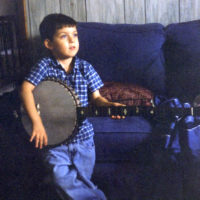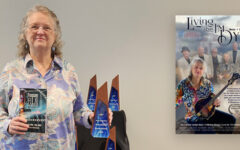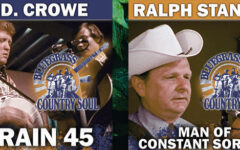
Kelley Gibson is the 23-year old son of Eric Gibson of the award-winning Gibson Brothers, and a talented bluegrass musician in his own right.
His father notes that Kelley was, “messing around with little guitars and ukuleles from the time he could walk.” Later, as a nine-year old mandolin novice, he was quickly adept at changing chords, without having the need to look. From there he went on to learn fiddle tunes. He really got the bug after his father took him to a bluegrass festival when he was 12 years of age.
However, as depicted in a film documentary The Madness & The Mandolin, this is a story about his struggle with illness; his learning to battle manic episodes and to cope with autism spectrum disorder, not through medication alone, but through bringing aspects of wellness – music and physical fitness included – into his life.
The 73-minute documentary made its debut at a film festival in Colorado, last year. Subsequent showings – at the Awareness Film Festival in Los Angeles and at 65th Annual Meeting of the American Academy of Child & Adolescent Psychiatry (AACAP), Seattle, Washington – have provoked a wider desire to employ alternative strategies to complement traditional medicine for the treatment of mental illness.
We spoke to Dr. Sean Ackerman, a Madison, WI specialist in child psychiatry, who made the film.
How did you learn about Kelley Gibson and his difficulties?
“His doctor, Jim Hudziak, MD, was my mentor when I was in fellowship training as a child psychiatrist.”
What was it that you first saw about Kelley’s illness that prompted you to realise the benefits of well-being, and in what ways was Kelley presenting his own solutions to his various ailments?
“Jim saw that for Kelley, medication had helped, but it wasn’t the whole answer. Instead, he recommended a pretty intense wellness regimen which consisted of a number of evidence-based wellness interventions (exercise, music, meditation, reading, diet), targeted toward some of Kelley’s struggles.”
So, what triggered the decision to make the film The Madness & The Mandolin? When was this?
“Jim is one of the most influential child psychiatrists in the country. His research is focused on how wellness strategies like music, exercise, and mindfulness can change the brain, and improve mental health outcomes. He and I were brainstorming about how to get some of those ideas out into more mainstream clinical practice.
Then Kelley was referred to Jim, and his story is just a perfect reminder that changing the way you live your life – through exercise, meditation, reading, and music – can sometimes be the most powerful treatment. With my film school background (I went to NYU film school before going to medical school), we thought a documentary would be the best way to get the message out.”
You are cameraman, director and producer of the film?
“Yep.”
When and where did it debut? And it’s now on DVD?
“It premiered at the Breckenridge Film Festival in September of 2018. It’s now available streaming in SD and HD on Amazon.”
What reaction have you had to the film? Have any additional/new treatments been made known to you as part of this reaction?
“I have had such an unexpectedly positive reaction! It’s been a joy. I have made movies before, and in the past there have been reasons to be disappointed with the reaction… but Kelley’s story is so powerful, and people seem to really respond to it.”
While the film has its origins within the bluegrass family, what can parents do to apply your lessons to help those offspring who suffer with autism, seizures and manic episodes?
“I would really ask people to watch the film. I think it has a lot of lessons for anybody struggling with mental health.”
Is there anything that you would like to add?
“I guess I would just add that it was an honor to spend time with Kelley and his family. They are truly good people who have inspired me deeply.”
This very profound and highly-praised film has been edited to approximately 45 minutes for release to the general public.
The trailer provides a brief look at what the film is about ….
Dr. Ackerman has a bachelor’s degree in fine arts from the Tisch School of the Arts at New York University, where he studied film making. Before his formal medical training he worked in the educational and research settings with children with autism.
Dr. Hudziak is a professor of psychiatry, pediatrics and medicine at the Larner College of Medicine at the University of Vermont.









